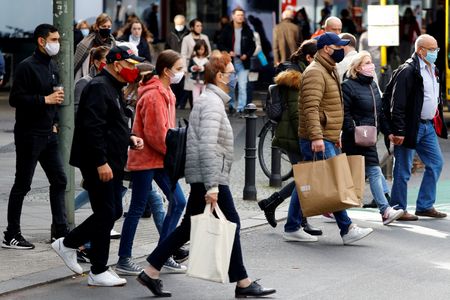 1
1 1
1
By Maria Martinez
BERLIN (Reuters) -German inflation fell in July, resuming the decline since the start of the year that was interrupted the previous month due to the base effects in June’s data.
German consumer prices, harmonised to compare with other European Union countries, rose by 6.5% on the year in July, preliminary data from the federal statistics office showed on Friday. This follows a 6.8% increase in June.
Analysts had forecast a harmonised annual inflation rate of 6.6% in July when polled by Reuters.
Although inflation fell in July, economists called the pace of decline sluggish mainly due to the comparison with last year.
Measures introduced in 2022, such as the temporary introduction of the 9-euro ($9.91) public transport ticket, a fuel discount in June, and the abolition of a tax on energy consumption to finance renewables in July, depressed prices last summer.
“From September onward, the recent somewhat sluggish retreat of inflation will probably accelerate again,” Commerzbank’s senior economist Ralph Solveen said, as the year-ago comparison normalises.
“However, inflation has not yet been defeated,” he said.
By comparison, inflation fell to 5.0% in France and it rose to 2.1% in Spain. Italian and euro zone inflation data is due on Monday. Economists polled by Reuters expect euro zone inflation to fall to 5.2% in July from 5.5% in June.
Non-harmonised inflation in Germany fell to 6.2% in July from 6.4% the previous month.
The data from Germany, the euro zone’s biggest economy, come as the European Central Bank is still looking for evidence that underlying inflation has turned a corner.
Germany’s core inflation rate, which excludes volatile items such as food and energy, stood at 5.5% in July, down from 5.8% in June.
Food prices continued to show above-average growth, posting a 11.0% year-on-year increase. Energy prices were 5.7% higher in July than in the same month of the previous year.
“The inflation balloon is only slowly sinking back to the European Central Bank’s target of 2%,” said Thomas Gitzel, chief economics at VP Bank Group. “The European monetary guardians will probably not be able to sit back and relax just yet.”
The ECB raised rates for the ninth successive time on Thursday but left the door open to a pause in September, even though core inflation seems to be stickier than previously thought.
($1 = 0.9083 euros)
(Reporting by Maria Martinez, Miranda Murray and Rachel More; Editing by Sharon Singleton)